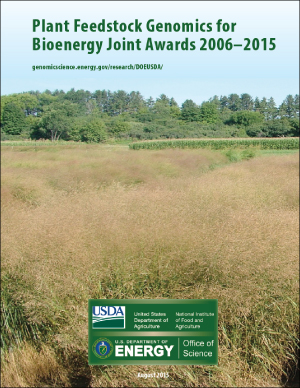Plant Feedstock Genomics for Bioenergy Joint Awards 2015
Report download: Print-quality PDF
Summary
Integrating the U.S. Department of Energy’s (DOE) capabilities in genomic sequencing and analysis for biofuels production with the U.S. Department of Agriculture’s (USDA) long experience in crop improvement, DOE and USDA are working together to fund projects that accelerate plant breeding programs and improve bioenergy feedstocks. Since 2006, dozens of projects have been funded by the DOE-USDA Plant Feedstock Genomics program, which is jointly supported by the Office of Biological and Environmental Research within DOE’s Office of Science and USDA’s National Institute of Food and Agriculture. This program supports fundamental biomass genomics research to provide the scientific foundation for the use of lignocellulosic and seed oil materials, either primary material or agricultural residues, for bioenergy and biofuels.
Significant advances in breeding, molecular genetics, and genomic technologies offer an opportunity to build upon the existing plant biology knowledgebase to be able to confidently predict and manipulate the biological function of plant genomes for bioenergy resources. This year, the program seeks to enhance these genetic and genomic resources by supporting research to investigate potential challenges likely to be encountered with increasing acreage devoted to bioenergy feedstocks, specifically the molecular mechanisms underlying plant resistance and tolerance to pathogens. This knowledge will be used to accelerate breeding of improved dedicated bioenergy feedstocks. Areas of interest include:
- Genomics-based research to identify and functionally characterize key plant genes/alleles that confer disease resistance/tolerance.
- Research to develop new cultivars of regionally adapted energy feedstocks with enhanced biomass yield and resistance/tolerance to pathogens.
Project investigators are characterizing the genes, proteins, and molecular interactions that influence plant response to pathogens with a focus on crop improvement. The long-term goal is to develop a clearer understanding of the key genes and processes responsible for superior feedstock plant performance under increasing pathogen pressure and with minimal impacts on the surrounding ecological landscape. The results will be used to develop improved, high-performing lignocellulosic biomass and oilseed crops for bioenergy.

